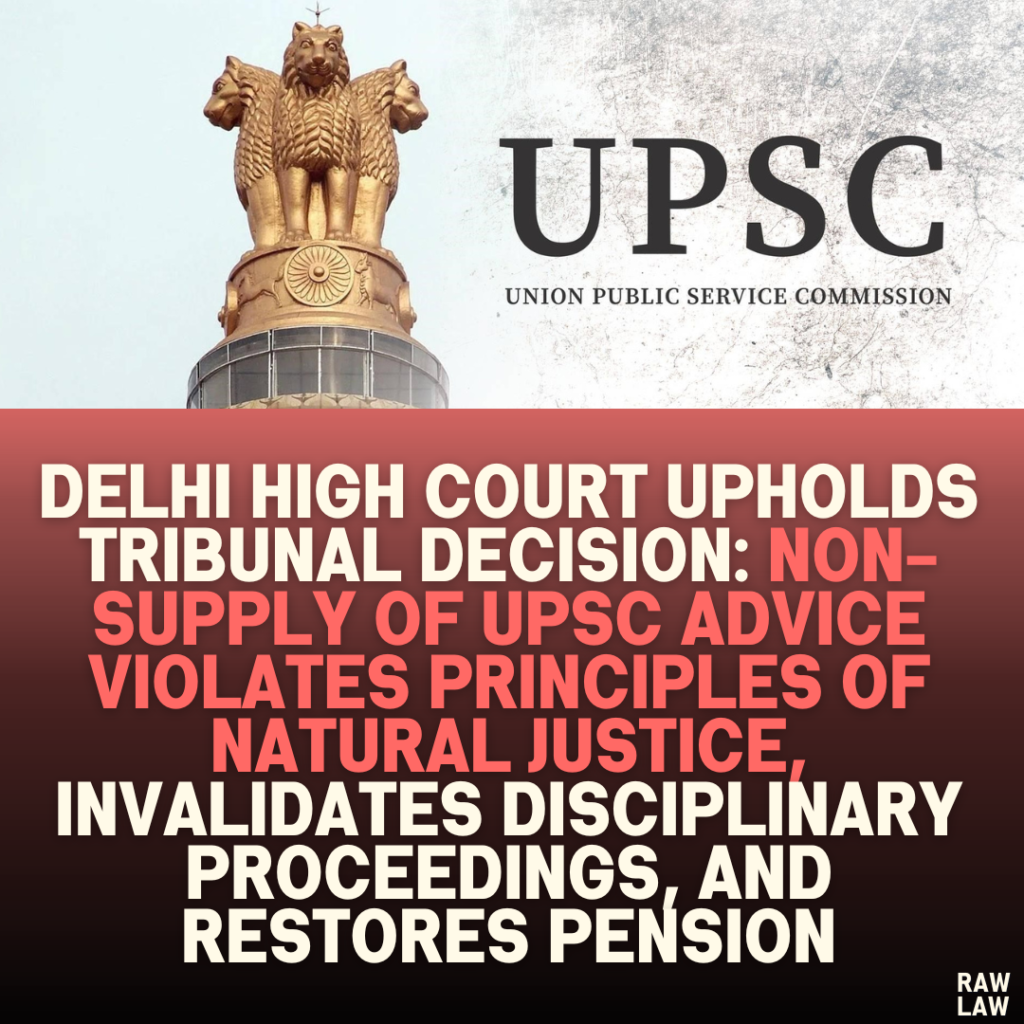Court’s Decision:
The Delhi High Court dismissed the writ petition filed by the Union of India, upholding the decision of the Central Administrative Tribunal (CAT). The Tribunal had set aside the penalty imposed on the respondent, which withheld 100% of his pension permanently. The Court reasoned that disciplinary proceedings were vitiated due to the non-supply of the Union Public Service Commission (UPSC) advice to the respondent before passing the final order. The Court observed that withholding such advice violated principles of natural justice.
Facts:
- The respondent was issued a charge sheet on June 6, 2005, initiating disciplinary proceedings. This led to an initial penalty of reduction in pay with a cumulative effect, which was affirmed by the Appellate Authority.
- Dissatisfied, the respondent approached the Tribunal in 2011. The Tribunal set aside the penalty and directed a reconsideration by the Appellate Authority. The penalty was subsequently reimposed.
- The respondent challenged the revised penalty through another application before the Tribunal in 2014. The Tribunal again quashed the penalty and directed the authorities to recommence the disciplinary proceedings from the issuance of the charge sheet.
- The disciplinary process culminated in an order in 2022, permanently withholding 100% of the respondent’s pension. The respondent filed a third application before the Tribunal, challenging this order on two grounds:
- The UPSC advice, forming the basis of the penalty, was not supplied to him before the final order.
- The punishment imposed was disproportionate to the alleged charges.
- The Tribunal set aside the penalty, appellate, and revisionary orders, restoring the respondent’s pension and allowing him to submit a representation for further consideration.
Issues:
- Whether the non-supply of the UPSC advice to the respondent before the penalty order invalidates the disciplinary proceedings.
- Whether the Tribunal was correct in quashing the penalty order and restoring the respondent’s pension.
Petitioner’s Arguments:
- The Union of India contended that the penalty order was valid and complied with established procedures.
- It argued that the UPSC advice was not mandatory to be supplied to the respondent before the final order.
- The petitioner requested the Court to defer its decision, citing pending proceedings in the Supreme Court on similar issues.
Respondent’s Arguments:
- The respondent argued that the disciplinary proceedings violated principles of natural justice since the UPSC advice, a critical document relied upon by the disciplinary authority, was not provided to him.
- He asserted that withholding the advice deprived him of an opportunity to present an effective defense and rebut the advice.
Analysis of the Law:
- The Court examined precedents on the issue of procedural fairness in disciplinary proceedings, particularly focusing on the non-supply of UPSC advice.
- The Court referred to S.N. Narula v. UOI (2011), where the Supreme Court held that non-supply of the UPSC’s advice to a delinquent officer constitutes a violation of natural justice.
- The Court also relied on its prior judgment in Mohan Singh Sandhu, which held that disciplinary proceedings are invalid if the UPSC advice is not furnished to the charged officer before being acted upon.
Precedent Analysis:
The High Court referred to the following key judgments:
- S.N. Narula v. UOI (2011): The Supreme Court mandated the disclosure of the UPSC’s advice to the charged officer before finalizing disciplinary proceedings to ensure compliance with natural justice.
- Mohan Singh Sandhu: The Delhi High Court had earlier ruled that disciplinary actions relying on UPSC advice without supplying it to the delinquent officer are procedurally flawed.
- Union Territory of Ladakh v. Jammu & Kashmir National Conference (2023): The Supreme Court emphasized that courts must follow the prevailing legal position and not defer decisions merely because a related issue is pending before a larger bench.
Court’s Reasoning:
- The Court observed that the Tribunal correctly followed the principles laid down in S.N. Narula and Mohan Singh Sandhu.
- It noted that the Tribunal’s order aligned with established principles of natural justice, as the failure to provide the UPSC advice deprived the respondent of an opportunity to effectively challenge the disciplinary authority’s conclusions.
- The Court rejected the petitioner’s argument to delay its decision due to pending Supreme Court proceedings, citing Union Territory of Ladakh, which requires courts to decide based on existing legal precedents unless explicitly directed otherwise.
Conclusion:
The High Court upheld the Tribunal’s decision, finding the penalty imposed on the respondent unsustainable due to procedural lapses. It confirmed the restoration of the respondent’s pension and allowed him to submit a representation for further consideration by the disciplinary authority. The writ petition filed by the Union of India was dismissed.
Implications:
- The judgment reinforces the necessity of adhering to principles of natural justice in disciplinary proceedings, particularly the obligation to supply critical documents like the UPSC advice to the charged officer.
- The ruling serves as a reminder to disciplinary authorities to ensure procedural fairness, failing which their decisions may be quashed.
